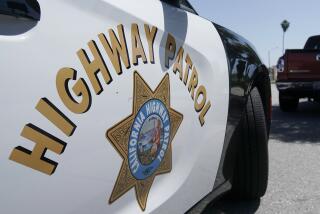Old Drug Cases Get 2nd Look in Terrorism Fight
- Share via
SACRAMENTO — Gov. Gray Davis’ newly appointed anti-terrorism advisor disclosed Tuesday that state and local police officers are reexamining old narcotics cases in the search for suspected Al Qaeda members and other hidden terrorist cells in California.
George Vinson, a retired FBI counter-terrorism expert hired to advise Davis on security issues in the aftermath of Sept. 11, also said that future public alerts by the governor on terrorist threats likely will be coordinated with Washington, D.C., and that California is ahead of other states in its readiness to deal with terrorism.
In his first meeting with Capitol reporters, Vinson, a lean 57-year-old with blue eyes and crew-cut hair, gave a straightforward assessment of California’s readiness to protect itself in the post-Sept. 11 era.
Although he avoided detailed discussion of the state’s response, he said the recently opened California Anti-Terrorism Information Center is aggressively gathering and sharing intelligence with local, state and federal law enforcement agencies.
The center, created by Davis and Atty. Gen. Bill Lockyer, gathers information from detectives, police officers on the street and others throughout the state. It then distributes the intelligence to agencies statewide in the hope that it will result in the arrest of terrorist-related suspects.
At the news conference, Vinson noted that since the attack on New York and the Pentagon, opium trafficking in Afghanistan has drawn the intense attention of law enforcement as a reported source of income for Osama bin Laden and his Al Qaeda network.
Simultaneously, Vinson said, federal and state investigators are concerned that Al Qaeda agents or underground cells of other terrorist operations may be operating in California.
In an attempt to pinpoint what he called terrorist “actors” and “players,” Vinson said state and local authorities are reviewing old narcotics cases “to see if they can develop any hopeful patterns on these terrorist cells.” The idea, he said, is that these almost forgotten cases might provide a link between narcotics distribution and hidden terrorists.
Vinson praised the 2-month-old information center, which is staffed by intelligence analysts and investigators from various departments.
“They went from zero to operational in eight weeks. I didn’t believe in my 34 years in government that you could do something that quickly,” said Vinson, who spent 24 years in the FBI and 10 years with the California Highway Patrol.
He said the unselfish sharing of intelligence among law enforcement agencies was crucial to the success of California’s anti-terrorism efforts. Often, departments jealously guard such information. For decades, the FBI has had a reputation among law enforcement officials as being the worst offender.
But Vinson told reporters that sharing of terrorist intelligence with the center has been excellent, including by the FBI.
He also said counter-terrorism methods used by California law enforcement officials will not be publicized.
Vinson, who ran such operations in San Francisco, Los Angeles and the San Joaquin Valley, said terrorists “are fairly well schooled” in their trade, but said they are “very poor at being criminals because usually . . . they leave a lot of evidence, a lot of transparencies behind.”
Vinson will be paid $118,000 a year. He occupies a small, windowless office in the governor’s Capitol suite and has direct access to Davis. He said he is working with the FBI and National Homeland Security chief Tom Ridge to devise a system that would enable federal and state officials to jointly make a public announcement of terrorist threats.
Davis stirred controversy earlier this month when he announced that he had received “credible” information that major California bridges would be the target of terrorists during a specific time period. He said he disclosed the information so that people could decide whether to use them.
No bridges were attacked, and the FBI subsequently said the threat was not based on a credible source.
To prevent a recurrence of such controversies, Vinson said Tuesday, the state is working with federal officials on a California system that would classify threats according to a four-level scale of alert. He said the scale would be a guide for decision-makers, and when a Level 1 alert was issued it would be done jointly by Davis and officials in Washington.
Asked how Californians would feel about their security if they knew everything he knows about terrorism and measures to combat it, Vinson said: “They would feel very comfortable and very pleased. Terrorists win when they make people anxious and fearful.”
More to Read
Get the L.A. Times Politics newsletter
Deeply reported insights into legislation, politics and policy from Sacramento, Washington and beyond. In your inbox twice per week.
You may occasionally receive promotional content from the Los Angeles Times.










